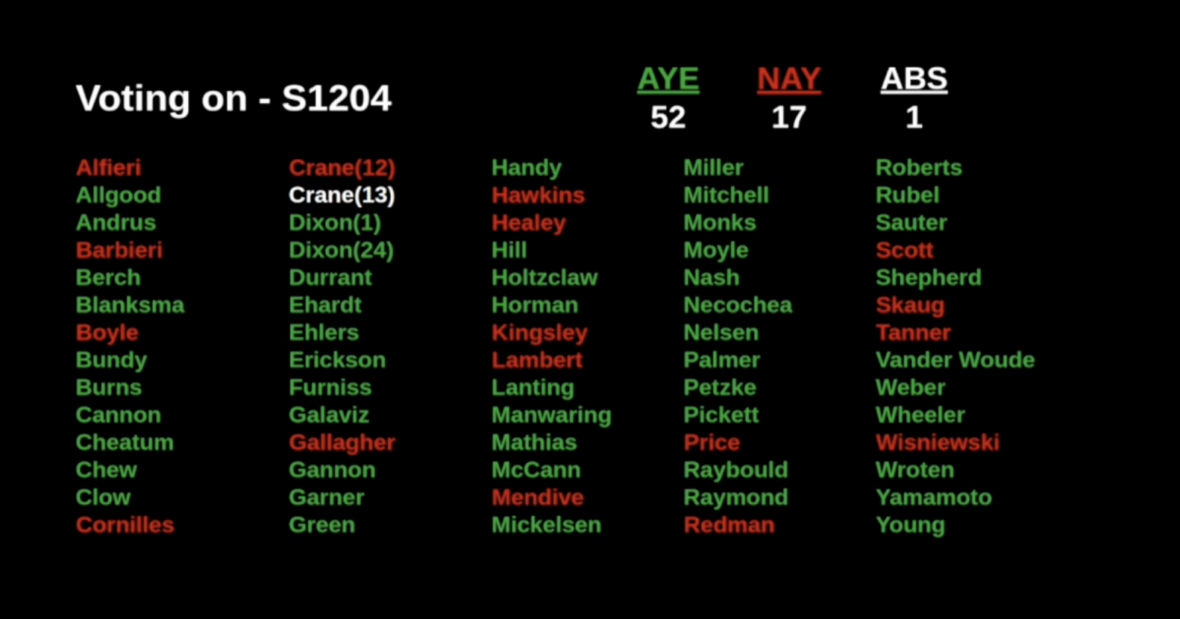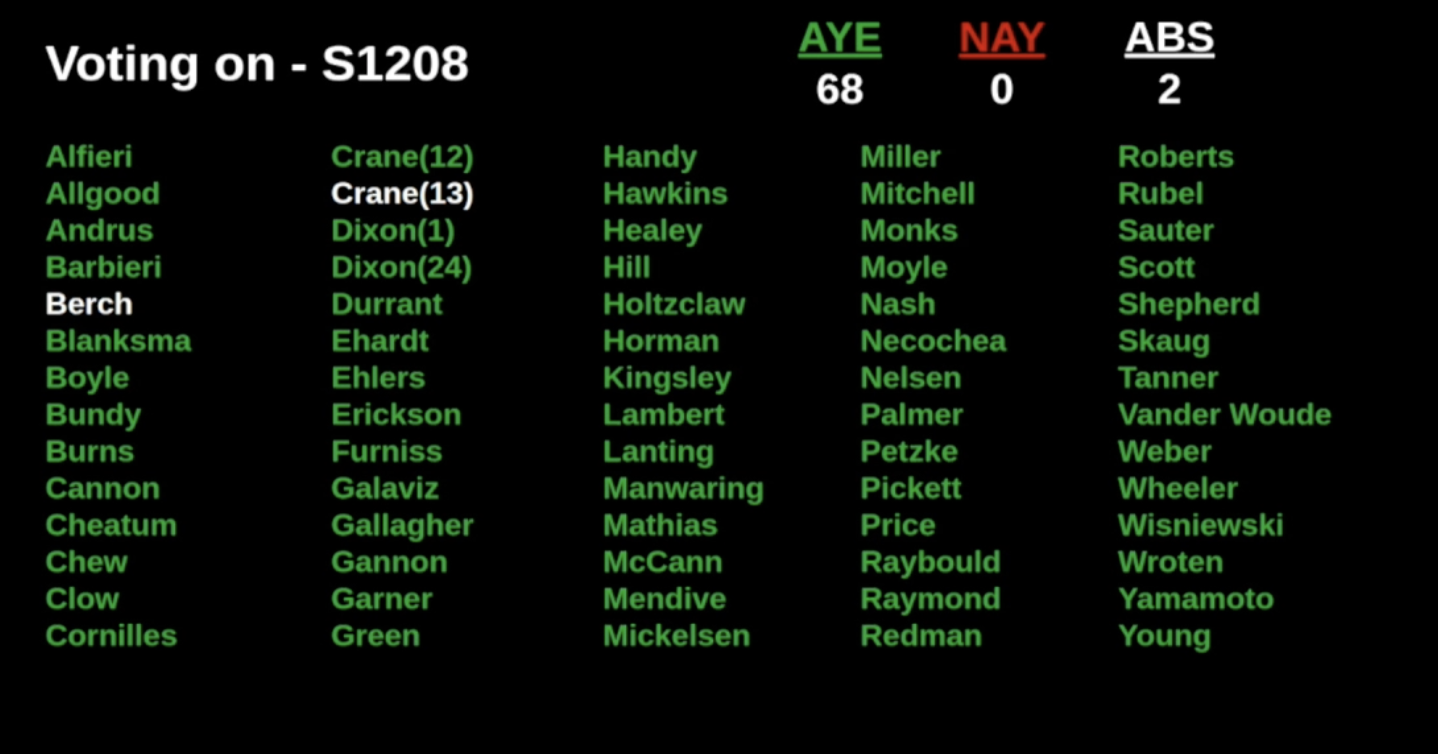The Senate finished off a rare — and resounding — veto override Wednesday, and a far-reaching property tax overhaul is now on the books.
On a 28-7 party-line vote, the Senate upheld House Bill 292 — which promises $355 million in immediate property tax relief, but has huge implications for public schools. The law earmarks $100 million that schools must spend on property tax relief, perhaps by paying down existing bonds or levies. But the law also eliminates the standalone March election, which had been the most commonly used date for school ballot measures.
The override vote caps a whirlwind two days — and a political showdown pitting Gov. Brad Little against the Legislature, and the House against the Senate.
On Monday, Little vetoed HB 292 — in part because the bill eliminated the March election date. By late Monday afternoon, the Senate passed a new-look property tax overhaul aimed at responding to Little’s concerns. The Senate’s rewrite left the March election date intact.
The House rejected the Senate rewrite Tuesday morning, on a party-line vote. By the afternoon, the House turned its attention back to HB 292, overriding Little’s veto on nearly a party-line vote.
That volleyed the ball back into the Senate’s court, and it took most of Wednesday for senators to act. After a lengthy closed-door caucus, the Senate cast two pivotal votes late Wednesday afternoon.
First, the Senate passed House Bill 376, a last-minute bill designed to address one concern Little articulated in his veto. HB 376 earmarks at least $80 million of sales tax money that the state can use as a bonding tool for road projects.
Democrats said the entire property tax package was needlessly complex. “I guess I’ll plug my nose, and vote yes,” said Sen. Janie Ward-Engelking, D-Boise.
HB 376 passed unanimously.
The debate on the override was even more brief, but the March election figured into the equation.
“This bill basically cripples schools, potentially, in the future,” said Sen. Melissa Wintrow, D-Boise.
Sen. Chris Trakel, R-Caldwell, urged his colleagues to work on behalf of local taxpayers, not schools or the governor. “Remember why we’re here,” he said.
Veto overrides are extremely uncommon in the Idaho Statehouse — where Republicans have long held huge majorities and the GOP has controlled the governor’s office for 28 years.
The last successful veto override evidently dates back to 2007, when the Legislature overrode then-Gov. Butch Otter’s veto of a bill banning smoking in bowling alleys. In 2002, lawmakers overrode then-Gov. Dirk Kempthorne’s veto of a bill repealing Idaho’s term-limits law.
Despite being on the losing side of the veto override, Little claimed victory in a Wednesday afternoon news release. He hailed lawmakers for passing “simpler” and “enduring” tax relief, while addressing his concerns about funding road projects.
“The process worked, and we are getting real property tax relief done for Idahoans,” Little said.
The 309-word news release made no mention of the March school election date.
In a later statement, a spokeswoman for Little said the fate of the March election was “unfortunate.”
“Gov. Little is proud Idaho has made record investments in public schools over the last four years,” Madison Hardy said. “It is unfortunate we lost some local control in school funding this session, but Governor Little remains committed to supporting education as his top priority in the years ahead.”
Operations budget moves forward after an evening vote in the Senate
After days of stalling, the Senate moved on a $1 billion K-12 budget Wednesday during another late evening at the Statehouse.
The spending bill covers school operations, including additional funding for transportation, technology, health insurance and discretionary spending.
It also seeks to fulfill one of Gov. Brad Little’s priorities for the year — filling a nearly $100 million gap in funding for school staff — through 4% pay raises for classified school employees. Funding for classified staff has been a concern among lawmakers, after a report from the Office of Performance Evaluations highlighted the funding gap last year.
“This budget is a big deal,” said Sen. Lori Den Hartog, R-Meridian, during Wednesday’s debate.
Den Hartog zeroed in on the chance that the budget will help reduce property taxes, as school districts ween off of bonds and levies.
Sen. Scott Herndon, R-Sagle, applauded the pay raises for classified staff, but took issue with the nearly $330 million in discretionary dollars, a $54 million increase from the previous year.
After a short debate, the budget bill passed 24-9.
School budgets get approval from the House
Two K-12 budgets are headed to the governor’s desk after a series of votes on the House floor.
Wednesday’s votes bring the Legislature closer to adjournment, but a few important education budgets are still on hold — a fact that isn’t lost on lawmakers.
“I was hoping all seven of them would roll out at one time so you could get the big picture. That’s not going to happen,” said Rep. Wendy Horman, jabbing at the Senate for putting the spending bills on pause.
So, what did the House pass Wednesday?
Administrator pay. A nearly $124 million budget for administrative pay and salary adjustments cleared the House, the final step before heading to Gov. Brad Little. The spending bill includes a 4% salary increase for K-12 administrators.
The bill passed 52-17.

Facilities. The House also stamped the seal of approval on the K-12 facilities maintenance budget, which amounts to nearly $68 million. The budget covers general fund allocations, and money from the Idaho Lottery and bond and levy equalization fund.
It passed 68-0.

House Ed leaves some items on the table after final meeting
The House Education Committee held an unorthodox final meeting Wednesday morning — with some loose ends, and without a posted agenda.
In the 10-minute meeting, the committee approved two resolutions rejecting State Board of Education rules. Rejections sometimes occur when the Legislature finds discrepancies between an agency’s rules and the statute they are tied to.
House Concurrent Resolution 17 rejects rules regarding charter schools and the public charter school commission. Senate Concurrent Resolution 107 relates to postsecondary institutions and proprietary school registration, specifically Western Governors University. As written, the rule would require WGU to register with the board as if it were an Idaho-based institution, which lawmakers found “unnecessary,” according to Tracie Bent, the State Board’s chief planning and policy officer.
Both rule rejections were approved by voice votes, and will now head to the House floor.
Committees customarily post agendas in advance, both online and outside their meeting rooms. Neither happened Wednesday. Chairwoman Julie Yamamoto said she elected not to post an agenda because Wednesday’s meeting was subject to the call of the chair, as opposed to a regularly scheduled meeting.
“I knew these two (resolutions) were coming through, and I thought we just needed to get them done,” Yamamoto, R-Caldwell, told EdNews Wednesday following the meeting.
And House Education’s final meeting leaves a couple legislative items unaddressed.
The committee did not take up Senate Bill 1071, Sen. Ben Toews’ attempt to ban sex education for students before the fifth grade. And Senate Bill 1153, a plan to create teacher spending accounts to subsidize out-of-pocket classroom costs, also fell by the wayside Wednesday.
With House Education’s adjournment, both bills are likely dead for the remainder of the session.
